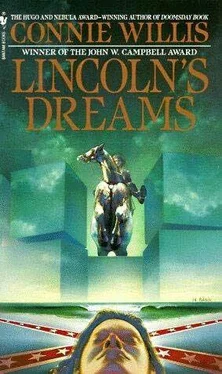Connie Willis - Lincoln’s Dreams
Здесь есть возможность читать онлайн «Connie Willis - Lincoln’s Dreams» весь текст электронной книги совершенно бесплатно (целиком полную версию без сокращений). В некоторых случаях можно слушать аудио, скачать через торрент в формате fb2 и присутствует краткое содержание. Город: New York, Год выпуска: 1992, ISBN: 1992, Издательство: Bantam Books, Жанр: Фантастика и фэнтези, на английском языке. Описание произведения, (предисловие) а так же отзывы посетителей доступны на портале библиотеки ЛибКат.
- Название:Lincoln’s Dreams
- Автор:
- Издательство:Bantam Books
- Жанр:
- Год:1992
- Город:New York
- ISBN:978-0553270259
- Рейтинг книги:3 / 5. Голосов: 1
-
Избранное:Добавить в избранное
- Отзывы:
-
Ваша оценка:
- 60
- 1
- 2
- 3
- 4
- 5
Lincoln’s Dreams: краткое содержание, описание и аннотация
Предлагаем к чтению аннотацию, описание, краткое содержание или предисловие (зависит от того, что написал сам автор книги «Lincoln’s Dreams»). Если вы не нашли необходимую информацию о книге — напишите в комментариях, мы постараемся отыскать её.
presents the story of a young historical researcher who is being pulled deeper and deeper into the time of the Civil War.
Lincoln’s Dreams — читать онлайн бесплатно полную книгу (весь текст) целиком
Ниже представлен текст книги, разбитый по страницам. Система сохранения места последней прочитанной страницы, позволяет с удобством читать онлайн бесплатно книгу «Lincoln’s Dreams», без необходимости каждый раз заново искать на чём Вы остановились. Поставьте закладку, и сможете в любой момент перейти на страницу, на которой закончили чтение.
Интервал:
Закладка:
She stopped and turned to look at me, expectantly, waiting for me to help her. And I could no more help her than Ben could keep them from taking away Caleb’s body.
And what had I expected? I had brought her here to this town that was all graveyard and told her about other graveyards—Arlington and Chancellorsville and Gettysburg—and, as it that weren’t enough, I had read her a whole book on the subject of Duty, hundreds and hundreds of pages of people who had just signed up they didn’t know why, of people who had to see it through even though they hadn’t counted on getting kilt.
Where had I thought it would lead, this road “past the second Manassas, to Chancellorsville,” except here? I should have known from the beginning that to get her away from Arlington, to help her past Fredericksburg and Jackson’s death, past even Gettysburg, was bound to lead to this, that all the roads Traveller carried Lee over had to converge here in an apple orchard near Appomattox Court House. She had dreamed about an apple orchard in the very first dream, an apple orchard and a house with a porch. I should have known then.
Lee had lost a third of his men at Sayler’s Creek. The day after, April seventh. Grant wrote offering surrender terms. Sheridan was moving west and north to block Lee’s retreat at Appomattox Station, and Meade had the rear guard under attack. The infantry wasn’t strong enough to fight its way through. Its only chance was to try to escape to the west, into the mountains, slipping around the Union flank, and for the next two days they tried that.
At dawn on April ninth. Palm Sunday, they attempted to break out near Appomattox Station, but the attack failed. Lee met with his officers in an apple orchard outside Appomattox Court House and told them he had arranged to meet with General Grant. The surrender terms were signed in the house of Wilmer McLean, a man who had originally lived near Manassas Junction. After the second battle of Bull Run, he had moved to the little village of Appomattox Court House, “where the sound of battle would never reach them.” The house was a two-story brick farmhouse. It had a covered wooden porch that ran the length of the building.
“We can’t stay out here in this snow,” I said. “It’s getting dark. Why don’t we go have some supper? Our waitress won’t know what to do with herself if we’re not there to have our coffee cups refilled.”
Annie’s uncovered hair was getting wet. It curled up around her face.
“Please,” she said, and held her hand out to me, and she was as far away from me as Ben had been from Nelly, distanced not so much by the dead man between them as by his own pain.
Maybe Annie was right, and the dream meant the war was almost over. Maybe the dreams were almost over, too, and we could both go home together, paroled. At Appomattox Lee had gotten Grant to let the men keep their horses.
“It’s not Easter,” I said, looking down across the graves, past the souvenir shops and the roofs and trees to the line of river, wondering if Lee had been thinking of Traveller when he asked Grant not to confiscate the horses. “It’s Palm Sunday.”
Lee had gotten up and dressed in his best, his dress uniform and a red sash and his blue military cape because, as he said, he was likely to be taken prisoner. “There is nothing left for me to do but go and see General Grant,” he told his officers, “and I would rather die a thousand deaths.” Lee asked advice of Longstreet and the other officers, and then mounted Traveller and rode to the McLean house. Along the way he saw Sam McGowan, his staff officer, struggling out of his muddy clothes and into a dress uniform, weeping like a child.
Annie and I went back down the hill, she holding my hand, the terraced steps already slippery, the graves hardly visible in the coming dark. The taxi was still there, its motor running and its windshield wipers going, the driver waiting patient as a horse.
I sent him home and took Annie to the coffee shop and told her about the last days before the surrender. Our waitress poured us cups of coffee that steamed the windows up so we couldn’t see out into the snowy darkness.
“They say it’s supposed to warm up tomorrow and turn into rain, but I don’t believe it,” she told us. “I hope you aren’t going anywhere.”
“No,” I said, and wished it were true. “We aren’t going anywhere.”
I took Annie up to the room and put her to bed. “I’ll be right here,” I said, as if she were going away, and held her hand till she fell asleep. Then I finished the acknowledgments and went and stood by the window and waited.
She lay perfectly still under the coverlet, one hand resting on her chest, the other at her side, her cheeks pale as marble. After a long time, she sat up in the bed, the green-and-white sprigged muslin over her hunched knees like a crinoline, and put her hands over her face.
“What is it?” I asked. “What did you dream?”
She looked up at me and tried to speak, her eyes full of tears.
“Did you dream about Appomattox?” I asked.
She nodded, looking straight ahead, the tears welling up, and she didn’t have to tell me what she had dreamed. I knew.
They met in the parlor of the McLean house in the early afternoon. Grant told Lee that they’d met before in Mexico and that he would have known him anywhere. He apologized to Lee for being in a field uniform and muddy boots. He and Lee discussed the terms of surrender, Grant doing his best to “let ’em up easy,” as Lincoln had ordered him to.
Lee told Grant that in the Confederate army the cavalry and artillery units owned their own horses, and asked that they be allowed to keep them since most of the men were small farmers and would need them for the spring planting. Arrangements were made to feed Lee’s army from Union supplies. The terms of surrender were drawn up and signed.
When it was all over, Lee came out of the house and stood by Traveller while the orderly buckled the bridle. Lee slipped Traveller’s forelock over the brow-band and smoothed it, absently patting the gray’s forehead. Then he mounted the horse that had carried him from “Fredericksburg, the last day at Chancellorsville, to Pennsylvania, at Gettysburg, and back to the Rappahannock” and rode back to the apple orchard to tell his men. “Men, we have fought through the war together,” he told them, “and I have done the best I could for you.”
The men, boys most of them, barefoot and hungry and dead on their feet, his men crowded around him, yelling out, “We’ll go on fightin’ for you. General!” and “I love you just as well as ever!” and “Goodbye!,” but most of them couldn’t speak at all and they reached out to touch Traveller’s mane and side and flanks. Lee looked straight ahead, his face set, tears in his eyes, but Traveller tossed his head all down the line, as if the cheers were for him.
“It’s all right,” I said. “You won’t dream anymore. The war’s over.”
She held out her arms to me, and I took her and held her and never let her go.
CHAPTER FOURTEEN
Lee seemed to understand the need for surrender before any of his generals did. By the time they made it to the apple orchard, half of his army had been destroyed. Nothing was left of the infantry but a few brigades and Longstreet’s and Gordon’s corps, and none of them had had anything to eat in days. Yet, when he showed Grant’s first letter of surrender terms to General Longstreet, Longstreet snapped, “Not yet,” and when he asked Venable what kind of answer he should send, Venable said stiffly, “I would not answer such a letter.” “Ah, but it must be answered,” Lee said.
The last night before the surrender he slept, all alone, under an apple tree, holding on to Traveller’s bridle.
Читать дальшеИнтервал:
Закладка:
Похожие книги на «Lincoln’s Dreams»
Представляем Вашему вниманию похожие книги на «Lincoln’s Dreams» списком для выбора. Мы отобрали схожую по названию и смыслу литературу в надежде предоставить читателям больше вариантов отыскать новые, интересные, ещё непрочитанные произведения.
Обсуждение, отзывы о книге «Lincoln’s Dreams» и просто собственные мнения читателей. Оставьте ваши комментарии, напишите, что Вы думаете о произведении, его смысле или главных героях. Укажите что конкретно понравилось, а что нет, и почему Вы так считаете.












